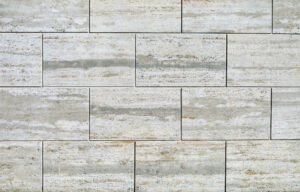Travertine flooring and surfaces are becoming increasingly popular due to their natural beauty and durability. If you’re considering installing travertine or already have it in your home and have questions about its care, Fuller Stone Care is here to provide expert guidance.
With extensive experience in natural stone, we are equipped to answer all your travertine queries and help you maintain its timeless elegance. Contact us now at 855-205-0972 to learn more.
What Exactly is Travertine?
Travertine is a type of limestone that forms around mineral spring deposits. Often referred to as travertine limestone or marble, it is neither; travertine is a distinct type of natural stone. Historically, it has been used in building for thousands of years, but today, it is more commonly found as flooring or countertops in modern homes and buildings.
Is Travertine Suitable for Outdoor Use?
Absolutely! Travertine is an excellent choice for outdoor spaces such as decks, patios, driveways, and pool areas. Its porous nature allows it to absorb water quickly, making it almost slip-resistant and safe for wet environments. Moreover, travertine surfaces do not become overly hot under the sun, providing a comfortable surface in all weather conditions. Its durability means that it can withstand the elements without cracking or degrading, making it a long-lasting option for any exterior.
Available Travertine Finishes
Travertine can be finished in several ways to suit different tastes and uses:
- Tumbled Travertine: Characterized by its rough, porous texture, this finish is ideal for a rustic look.
- Honed Travertine: Offers a smooth, matte surface that works well in both traditional and modern settings.
- Polished Travertine: Features a glossy surface that enhances the stone’s natural colors and patterns, perfect for a more sophisticated aesthetic.
At Fuller Stone Care, we can apply the finish that best suits your style and functional needs.
Durability of Travertine
Travertine is incredibly durable. As a natural stone, it has stood the test of time—not only in terms of structure but also in color and finish. Unlike other materials that might fade or degrade, travertine maintains its integrity and appearance, making it a preferred choice for many homeowners.
Sealing Travertine: Is It Necessary?
The need to seal travertine depends on its finish and where it is used. For example, travertine around a saltwater pool should be treated with a water-repellent sealant to protect it from erosion. Similarly, kitchen installations might require a sealant that protects against stains and spills. At Fuller Stone Care, we provide consultations to determine the best sealing options based on your specific usage and environment. Generally, sealing travertine is advised in high-traffic areas, both indoors and outdoors, to preserve its beauty and longevity.
Best Practices for Cleaning Travertine
Maintaining travertine is straightforward. Daily cleaning routines can include wiping spills promptly and regular sweeping to remove debris. For long-term care, Fuller Stone Care recommends an annual maintenance schedule that includes thorough cleaning and resealing if necessary. This ensures that your travertine remains in pristine condition year after year.
Contact Fuller Stone Care for Expert Travertine Care
Whether you’re contemplating a new travertine installation or need assistance maintaining existing travertine surfaces, Fuller Stone Care is here to help. Contact us today at 855-205-0972 to learn more about our services or to schedule a consultation. Let us help you enhance and protect the natural beauty of your travertine, ensuring it adds elegance and value to your space for years to come.

